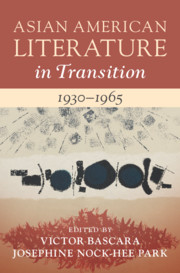Book contents
- Asian American Literature in Transition, 1930–1965
- Asian American Literature In Transition
- Asian American Literature in Transition, 1930–1965
- Copyright page
- Contents
- Figures
- Contributors
- Series Preface
- Introduction
- Part I Transitions Approached through Concepts and History
- Part II Transitions Approached through Authors, Texts, Concepts, and History
- Chapter 8 Lin Yutang and the Invention of Asian America, 1949
- Chapter 9 H. T. Tsiang Against the World
- Chapter 10 “A Congressman from India”
- Chapter 11 Younghill Kang, Transpacific Agent
- Chapter 12 Transition and Obliteration
- Chapter 13 America Is in the Heart as Postcolonial Pastoral
- Chapter 14 Bienvenido Santos
- Chapter 15 Women Writing War in Asia/America
- Chapter 16 Japanese Incarceration, Settler Colonialism
- Chapter 17 Jade Snow Wong and the Making of Model Minority Democracy
- Chapter 18 A Little Bit of Form Goes a Long Way
- Chapter 19 Richard Eun-kook Kim
- Select Bibliography
- Index
Chapter 16 - Japanese Incarceration, Settler Colonialism
from Part II - Transitions Approached through Authors, Texts, Concepts, and History
Published online by Cambridge University Press: 27 May 2021
- Asian American Literature in Transition, 1930–1965
- Asian American Literature In Transition
- Asian American Literature in Transition, 1930–1965
- Copyright page
- Contents
- Figures
- Contributors
- Series Preface
- Introduction
- Part I Transitions Approached through Concepts and History
- Part II Transitions Approached through Authors, Texts, Concepts, and History
- Chapter 8 Lin Yutang and the Invention of Asian America, 1949
- Chapter 9 H. T. Tsiang Against the World
- Chapter 10 “A Congressman from India”
- Chapter 11 Younghill Kang, Transpacific Agent
- Chapter 12 Transition and Obliteration
- Chapter 13 America Is in the Heart as Postcolonial Pastoral
- Chapter 14 Bienvenido Santos
- Chapter 15 Women Writing War in Asia/America
- Chapter 16 Japanese Incarceration, Settler Colonialism
- Chapter 17 Jade Snow Wong and the Making of Model Minority Democracy
- Chapter 18 A Little Bit of Form Goes a Long Way
- Chapter 19 Richard Eun-kook Kim
- Select Bibliography
- Index
Summary
Miné Okubo’s Citizen 13660 depicts the US government’s attempt to manage and eliminate a problem population, first through incarceration, then through ethnic dispersal. This chapter argues that this book should be read within its immediate historical context: that of US Indian termination, the period from the 1940s to the 1960s, when the US government worked to dismantle tribal sovereignty and force indigenous peoples to assimilate and live “as Americans.” Reading Okubo’s work within this historical context makes her indictment of American democracy clear: this chapter shows that Citizen 13660 riffs on tropes of European immigration and settlement in order to establish a counterpoint between Euro-American and ethnically Japanese populations. Okubo reveals how systematically and how variously Japanese Americans are excluded from the promises of freedom, prosperity, and inclusion made to white settlers, emphasizing how the forms of inclusion that followed incarceration extend rather than mitigate the state’s attempt to eliminate the Japanese American community. The settler colonial analytic through which I approach Citizen 13660 reveals that processes of removal, incarceration, and dispersal constitute a pattern that can be traced across time and across racialized populations. Japanese incarceration exemplifies how settler states use inclusion and assimilation to manage and eradicate populations deemed undesirable.
Keywords
- Type
- Chapter
- Information
- Asian American Literature in Transition, 1930–1965 , pp. 281 - 297Publisher: Cambridge University PressPrint publication year: 2021

